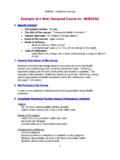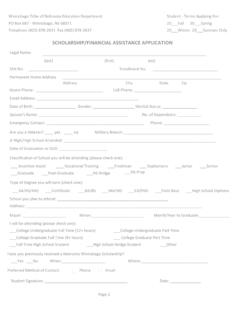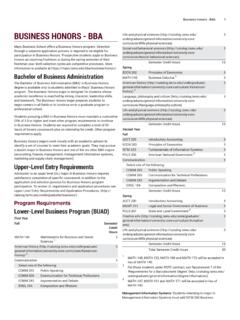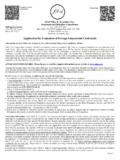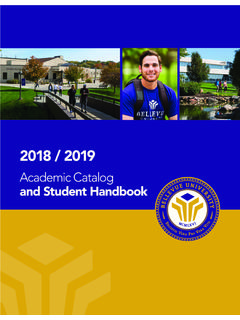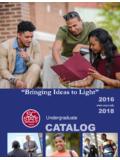Transcription of Example of a Well-Designed Course in: “First-year ...
1 Website: Example of a Well-Designed Course in: first - year experience transition . Name: Glenda Hensley Name of Institution: Western Carolina University 1. Specific Context The subject matter: first - year experience transition and introduction to Leadership The title of the Course : The Creative Life Typical class size: 25. Level of the Course : freshman Mode of delivery: face-to-face Type of institution: University 2. General Description of the Course Course Description: Pathways to LEAD the way! This Course provides an introduction and opportunity for you to transition to university life, as you discover the resources available (academic, co-curricular, community). You will examine the principles of leadership through the thematic lens of the arts. This subject of this Course is you. It is intentionally designed to promote your self-awareness and personal success in college and in life after college by empowering you with flexible skills and strategies that are applicable across subjects (transferable, cross-disciplinary skills) and across time (durable, lifelong learning skills).
2 LLC - Living Learning Community: In a Living-Learning Community, students are organized into living-learning cohorts that appeal to their interests and goals, thus the classroom and the living room reinforce and promote integrated learning. These communities connect residential life with one Course or a full academic cohort. Your LLC will work collaboratively and expressively in an exploration of the arts, leadership, and learning as you transition to college life at WCU. 3. Big Purpose of the Course My hope is that 5 years after my students leave the institution, as a result of this Course , they can identify their life and career goals and possess the skills, 1. attitudes, and knowledge to analyze choices, act on purpose, and reflect on the outcomes; face opportunities and challenges with confidence, creativity, critical reflection, and clarity of intent and values; and work well with others. The Life Value of the Course is to prepare students to define and refine their goals and possess the skills, attitudes, and knowledge to analyze choices, act on purpose, and reflect on the outcomes - adjusting as warranted.
3 Learn how to find and use the resources and services available that will support their goals empower successful outcomes (personally, academically, socially, and civically). face opportunities and challenges with confidence, creativity, critical reflection, and clarity of intent and values;. and work well with others and live with integrity. Purpose as stated in Course Syllabus: The Purpose of this Course is to: 1. connect you with other students , to help you form peer-support networks and peer-learning communities;. 2. connect you with the college , to promote (a) your appreciation of the meaning and relevance of the college curriculum (liberal arts & sciences), (b). your involvement in the co-curriculum (out-of-class experiential learning), and (c). your use of campus support services (academic-support and student- development services);. 3. connect your present college experience with your future goals and plans . , to help you relate your current college experience with your upcoming decisions about your college major, your future career path, and your life beyond college.
4 4. connect you with the principles of leadership - , to help you understand the importance of leadership to your college experience and your life. 4. Important Situational Factors/Special Pedagogical Challenge 1. Specific Context Expectations of others Characteristics of the subject: A. Context: This face-to-face Course is a first - year ( first -semester), 100-level Course with 2 credit hours. It is housed in the Leadership minor in the College of Education and Allied Professions - School of Teaching and Learning. The Leadership minor is in the department of Human Services. It meets two times per week for 50-60. minutes. The class size is capped at 25 students who are also co-located in a residence hall with other themed LLC's in one of 3 different halls - 2 of which are exclusive to first - year 's and the 3rd is a mixed population. Students are enrolled by the advising center during summer orientation based on their top preferences selected via our on-line admission-to-orientation Catwalk system.
5 B. Expectations: All of our transition pathway courses are expected to introduce students to a set of learning outcomes that encompass an introduction to 17 aspects of university life defined as the Core elements - those procedural, social, personal 2. development resources, etc. that will foster successful transitions to college life. In addition to these outcomes, the LEAD LLC courses also provide an introduction to the principles of leadership and thus have an added dimension. Finally the LLC's are thematic and as such, each frames learning outcomes by the thematic focus and reframes or establishes one or more thematic learning outcomes. C. Subject: The subject matter for the Course (student success) is both convergent and divergent. Some content is basic, fact-driven, resource or service based information. "Advising day is set and this is how you register for classes." However attending and writing a reflection about an event or service-learning project are open-to diverse views.
6 Learning to get along in a new community of learners is a wonderful and messy process - with many ways to accomplish the goals and many ways to experience success. The Course is to prepare them for the many aspects that make up college life and as such is multi-dimensional and complex. 2. Characteristics of the Students & Teacher: A. Students: Because students arrive with a tremendous range of readiness for the transition to college life, they also arrive with a range of attitudes about the need for or purpose of the Course . Many assume they do not need help with adjusting to college life (personal, social, or academic). Many assume that because high school was easy for them, so will be college. Many others are fearful of the change and what to expect - even if not willing to admit it. Some may be ready academically, but not socially or personally and also the reverse. Some are independent, confident and easily slide into gear. Others do not. However, they all have to learn how to navigate the new terrain and each will have different needs and different pacing.
7 Therein lies the problem - how to make sure they have all been introduced to the basic needs while keeping them motivated and excited - helping them discover how to 'do' community and to help each other - how to foster individual growth in a healthy garden. Student expectations also have an impact. The nature of the Course lends itself to being considered 'non-academic' and not serious on first entry - a perception also perpetuated by many academic departments/faculty. Therefore, some students are resistant to Course assignments and particularly those that require reading and writing -- thus some will resent the Course and instructor when they discover they actually have assignments and grades. B. Teacher: I love teaching with creative strategies and challenging students to find their creative voice and in that sense this Course should be easy for me - a perfect fit. I am very organized and love to plan programs and events - another plus for this class and its thematic focus.
8 I am deeply committed and eager that they each have a positive and successful learning experience and that they find themselves ready for their next steps - again a positive for the role. However, prior to this Course , I have not had any formal background in leadership programming - so that became new content for me to integrate. Further, my teaching approach is more faculty than staff mindset - yet most of those who teach our transition courses are staff, many of whom are student affairs professionals. So I found myself constantly questioning myself and my normal ways of teaching this past fall, hoping that I was not expecting too much of the students 3. Special Pedagogical Challenge: Student Characteristics: essentially those factors I described above. 4. 5. 3-Column Table Use this table below to provide information about these three aspects of your Course design. Learning Goals: Assessment Activities: Learning Activities: 1. Foundational Knowledge Pre-Post survey * Lecture/presentation understand academic policies, 'Quiz-bowl' style game 'Quiz-bowl' style game procedures and how to access simulations simulations information and resources; 'Class Pass': Index card with key Reading /Class discussions &.
9 Identify principle Leadership and points from assigned reading dialogues personality traits / styles (ethics, Guest speakers/presentations integrity, communication skills, Leadership Practice Inventory perseverance) (LPI) workshop & self- "Lost" simulation assessment Leadership Practice Inventory (LPI) workshop 2. Application Goal-setting workshop and Goal-setting workshop and assess personal needs and goals journal journal to effectively connect with the 'Five-fingers Mandala' (goal 'Five-fingers Mandala' (goal campus community (academic, project) project). social, co-curricular, and civic): Education Briefcase (eB). o practice the Social Change workshop Model of Leadership, o analyze how the arts inform Create personal Values Shield Service learning project Create personal Values Shield and are informed by social, Service learning project cultural, and personal stories;. Analysis charts/papers for events Products created for art exhibit * Attend arts events and analyze/reflect Art Museum: Process drama workshop Create /identify products for art 5.
10 Exhibit 3. Integration Cognitive Map & Timeline Generate Cognitive Map &. identify the interactions & Residential program design Timeline using text and campus relationships among the curricular, documents. co-curricular, social, and personal Design /present a Residential dimensions of their college program experience with future goals: Resume and cover letter o connect learning theories Education Briefcase Peer Career Mentor presentation: (cognitive & emotional) with Resume and cover letter performance outcomes "If I could major in fun". (academic, social, personal) eB: how to organize by learning o integrate artistic media and Individual multimedia presentations goals methods with communication and presentation skills; Design/plan/host art exhibit Individual multimedia presentations Art Museum: facilitated workshop How to: Design/plan/host art exhibit 4. Human Dimension: interact with other students in About Me paper order to form peer-support networks and peer learning Residential program debrief communities: Residential program debrief dialogue * dialogue o understand Leadership as a relationship process, Self: Service learning reflection paper Service learning project debrief o clarify values and develop a dialogu0065.
